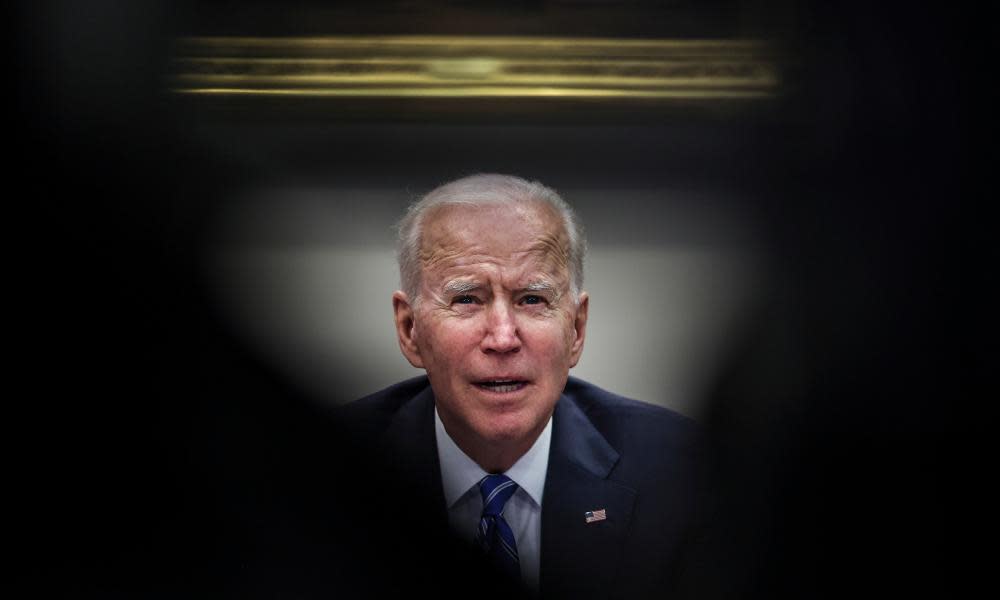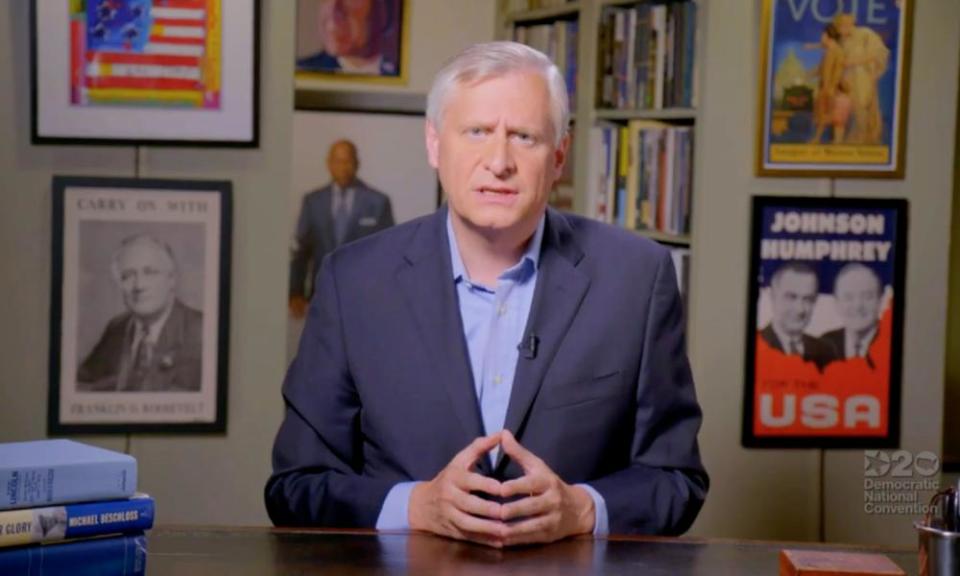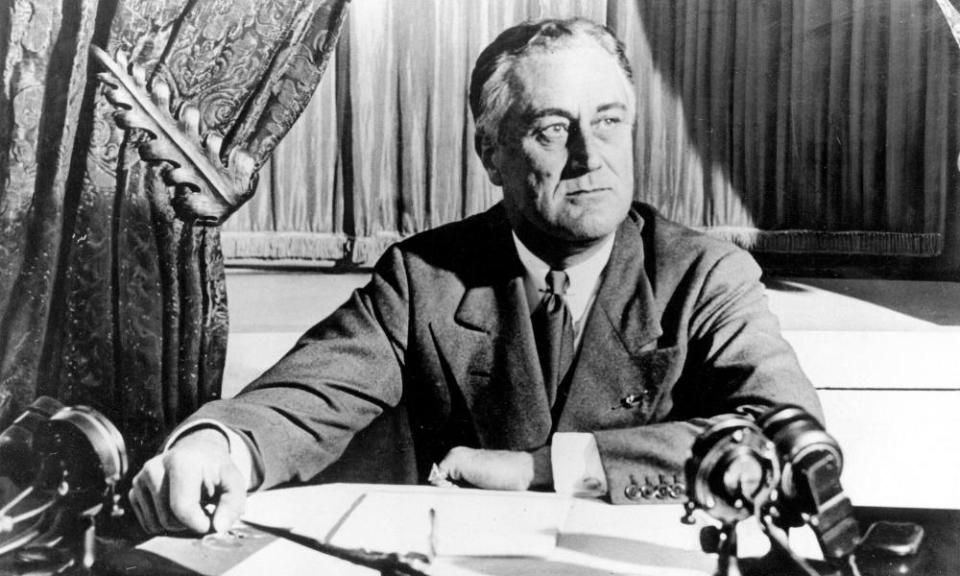‘He’s like an upside down iceberg’: historian Jon Meacham on Joe Biden

He has been described as Joe Biden’s “historical muse”, an occasional informal adviser to the US president and contributor to some of his major speeches including the inaugural address.
In March, Jon Meacham put together a meeting between Biden and a group of fellow historians at the White House that lasted more than two hours. What did he learn about the 46th president?
Related: Biden's FDR moment? President in New Deal-like push that could cement his legacy
“He’s like an upside down iceberg,” the Pulitzer prize-winning historian says by phone. “You see most of it and that’s not spin: there’s just not a lot of mystery to Joe Biden. The last four or five minutes of his press conference in the East Room [on 25 March] when he talked about democracy and autocracy, that was pretty much it.”
Media reports of the meeting told how Biden took notes in a black book and at one point turned to historian Doris Kearns Goodwin and said, “I’m no FDR, but …” Meacham does not recall that remark, a reference to former president Franklin Delano Roosevelt, and does not see Biden as self-aggrandizing.
“It was not about, how do I shape my legacy? It was how have previous presidents dealt with fundamental crises. FDR came up less because of the FDR legend but more in 1933 it was an open question about whether democracy would survive the 30s. So it was how do you articulate a case for democracy with all its inherent messiness?”
This existential struggle between democracy and autocracy, highlighted by Biden repeatedly during his first 100 days as he contemplates the rising threat of China, is the president’s own formulation and predates his meeting with the historians, Meacham says.
But to go back to that upside down iceberg metaphor, the 51-year-old author, who gave a speech at last year’s Democratic national convention, suggests that what you see with Biden is what you get. Future biographers will struggle to uncover a “real Joe Biden” that we all missed at the time. (In that sense, perhaps, we have finally found something he shares with Donald Trump.)
“I suspect 90% of what I’ve heard Joe Biden say in private for years, he says in public, and the other 10%, it’s not like there’s some secret dark side of Biden,” Meacham says. “I’m puzzled by it, honestly. I think part of it is being 78, thinking that everything was done – he had no expectation [of becoming president] in 2017.
“So I think people should take him at his word. My experience with him – and we are friends – is that he’s very straightforward. There’s not a lot of machiavellian behind-the-scenes stuff going on. That might not have been true when he was 40 but he’s now almost 80 and it is true.”
Barack Obama also hosted Goodwin and other historians at the White House, apparently more focused on lessons from Abraham Lincoln than Roosevelt. Trump nurtured Mount Rushmore ambitions but had little time for presidential scholars and, at roughly his 100-day mark, hosted the rightwing rockers Ted Nugent and Kid Rock along with the former Alaska governor Sarah Palin.
Meacham – whose new podcast, Fate of Fact, features historians Michael Beschloss and Eddie Glaude Jr, both of whom attended the Biden summit – recalls the story of how Bill Clinton once drew up a list of truly consequential presidents and wondered how he could get on it.
“That’s not Biden and I’m not saying that somewhere in his brain that’s not unfolding; I don’t know,” he says. “But I think I have a pretty good sense of this and I think he genuinely sees this as an existential moment for democracy. He sees clearly definable problems that have to be solved and, in so far as case studies of past successes and past failures can be an arrow in his quiver, I think that’s what he wants.”
The Roosevelt parallel, manifest in a giant portrait in Biden’s Oval Office, persists not only because the 32nd president helped defeat fascism in the second world war but because his New Deal in 1933 steered America out of the Great Depression. Faced with multiple crises including the coronavirus pandemic, Biden has sought to rebuild trust in both government and democracy with an audacious $6tn spending project that also echoes Lyndon B Johnson’s “Great Society”.

Some have hailed it as a death blow to four decades of Ronald Reagan’s trickle-down economics. But Meacham, a biographer of Thomas Jefferson, Andrew Jackson and George HW Bush, would not go so far: “One way to think about 1933 to 2017 was as a figurative conversation between FDR and LBJ on one side and Reagan and George W Bush on the other. Every president was somewhere in that conversation.
“Trump was not a sequential chapter to that. I think Biden is back in that conversation. He’s clearly in the FDR/LBJ mode but I see that as a resumption of a conversation about the means to commonly agreed upon ends. Biden is not creating new government agencies. Is it a pendulum swing? Certainly from George W Bush, yeah, but it’s not outside the American mainstream.”
Trump’s break from the mainstream, and the willingness of the Republican party to follow him off the cliff edge, is the starting point for Meacham’s podcast to explore polarisation and “how and why facts became a casualty of war in the United States”, culminating in the deadly insurrection at the US Capitol on 6 January.
Republicans made campaign promises in election after election but failed to follow through, he argues, resulting in a buildup of frustration among their voters. “We haven’t had a major political party of ours lose its bearings so profoundly perhaps in American history. I wanted to try to give a historically informed understanding of why this has happened now on the grounds that if you have a diagnosis, then at least you can think about treatments.
“I don’t think Trump emerged out of the ether. This was a long time coming because the base itself has been disenchanted and aggrieved by the paucity of the fruits of victory going back to world war two. It’s not just that Trump himself has superpowers; it’s a matter of context. The podcast is basically my understanding of why so many otherwise sensible Republicans signed on to a cult of personality.”

Biden’s first 100 days have certainly been less noisy and melodramatic than his predecessor’s, a palate cleanser devoid of puerile insults or late-night tweet storms. But he has made little headway with his promise of bipartisanship as Republicans dig in for a long fight against his ambitious legislative goals. “Boring, but radical,” is the Texas senator Ted Cruz’s analysis.
However, Meacham – whose 2018 bestseller, The Soul of America, foreshadowed the central theme of Biden’s election campaign – notes that his approach polls strongly with the general public while Republicans veer off into “culture wars” issues such as the rights of transgender student athletes or the withdrawal of six Dr Seuss books due to racially insensitive imagery.
“My sense is that he has argued for an American as opposed to a partisan reaction to a series of crises that he has defined and articulated. He is not repeating the mistake that was made in the Obama years of seeking Republican buy-in because they can’t deliver; in foreign policy terms, he doesn’t really have a partner for peace.
“He’s basically decided he’s got to get everything done that he can because he genuinely believes that it’s an emergency situation and he does it in a temperamental way that is more congenial than divisive, which forces the Republicans into an even smaller corner where, because what he’s doing is broadly popular, you end up fighting about Dr Seuss. The Republicans are in this perpetual bar fight, so they’re grabbing for anything they can. I don’t think it’s a durable governing strategy.”

